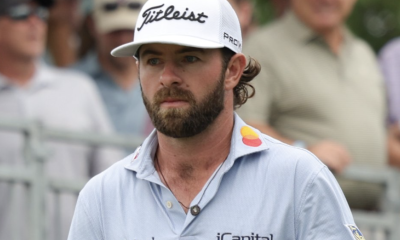Opinion & Analysis
Ryder Cup Sunday Reflection: Do the Europeans just care more?

Of course, every competitor “cares” in the way that they want to win, and they prepare themselves accordingly; displays of emotion are more about personality than actually caring. “Who wants it more?” is a common commentator cliche, and a bad one at that. But in this article, I’m talking about really care, as in, if your backs are up against the wall you’ll do anything to win, including provide energy and spark even when getting trampled. Not just maintain acceptable body language despite losing, but acting in ways that inspire teammates. Fight and claw until the bitter end. And it starts at the top, with the veterans and future hall-of-famers, who know who they are.
The United States needs more care in them, it seems.
I’m going to call it the “Larry Nelson Curse.” Until the PGA of America publicly apologizes to Larry Nelson, the last guy to go 5-0 before Moli-Moli-Moli-Moli-Moli-Moli MOLINARI, for not giving him his richly-deserved captaincy, Team USA will never again win on foreign soil. Sad part is, it doesn’t seem they care. Very few players showed urgency, passion, zeal or enthusiasm this week in France. Take note of the “Or” and not the “And” in the preceding sentence; to hope for more than one of those adjectives was asking too much of Team USA. It could also be labeled “Watson’s Vindication.” After the infamous player rebellion of 2014, in response to Tom Watson’s heavy-handed captaincy, the players were given more say in player selection, but here we are, four years later, with eerily similar results overseas. Team USA couldn’t have been given a more American golf course; Le Golf Nationale seemingly was the player to be named later in the Statue of Liberty deal, hewn from the swamplands of south Florida. Yet here we are again, marveling at the creativity and camaraderie of Team Europe, wondering why the lads from the west can’t get this thing figured out. I could go into Azinger and his pods, but why discuss the only USA dominance of the past 20 years? It’s like ripping off a scab.
To be fair, Team USA is played out. I blame the catty relationship between the PGA of America (which co-runs the event) and the PGA Tour (which supplies the talent). You would think that the two bodies could get together and say, hey, a win benefits both of us. Let’s, for example, not schedule the FedEx Cup’s Tour Championship immediately prior to these matches. They seem to have that figured out for the near future; the leaner playoffs will end in late August, and the 2020 Ryder Cup, at Whistling Straits in Wisconsin, will be played the last week of September. That should give everyone time to chillax and lose their games, or find them. Who knows?
Every session, Team Europe plays with a massive chip on its shoulder. This chip is a healthy, motivational thing. Do you think, for just a second, that any member of Team USA feels like an underdog? No, they don’t. I don’t get how Bubba Watson doesn’t play with a chip on his shoulder. He seems to win in Augusta and Hartford, and that’s it. Is he too comfortable? I don’t know how Webb Simpson doesn’t play with a chip on his shoulder. He won a U.S. Open, then took half a decade off before winning the Players Championship. Two wins, no matter how big, in 8 years makes me wonder how much of a closer he is…and he went to my alma mater! I don’t know how Phil Mickelson and Tiger Woods don’t play with a chip on their shoulders. They had to be captain’s picks, despite being the best golfers of a generation. They knew that they would be under a SwingVision lens, yet nothing.
In 2018, Europe dominated Team USA in all three formats. They won the singles competition by three points, tied the fourballs (better ball) events after spotting the visitors a 3-1 advantage, and rolled the foursomes (alternate shot) by a 6-2 margin. In 2014, Europe won by 5 points. Team USA returned the favor by winning by 6 points in 2016. Offended, the Euros won this one by 7 points. As much as Le Golf Nationale should have played into USA hands, Whistling Straits should remind fans of links golf of, well, almost a European links course. If Steve Stricker, the consumate Wisconsonian, is not named captain of Team USA, I’ll eat my cheese curds. I’m sure that they will be delicious. Stricker’s game was never about bomb and gouge, yet the majority of his golfers will be more comfortable with that game than the one demanded by LGN this past week. Can Whistling’s fairways be widened? Or, can tees be pushed up enough to allow Team USA to find wider areas, farther down the fairway? Failing that, can the tees be pushed soooooo far back, to 8K yards, that it will take a 300-yard carry to reach the fairway? Like sands through the bunker rake, these are the days of our lives.
In order to win over Buffalo fans, players new to the Sabres and the Bills (my hometown teams) need only do one thing: play like they care. Team USA looked flat and uninterested, while Team Europe was everything but that. I suspect that fans of Team USA will demand this of their golfers in 2020 and beyond. It’s to be expected that the squad will want to play well on home soil in 2020, but will they be able to carry it over to Rome in 2022? I have my doubts. As golfers aren’t allied with cities and regions, as happens in other major sports, we never truly invest our hearts in them, unless a team event is underway. Do we have a right to expect something patriotic from them, once a year at most? Perhaps not.
Opinion & Analysis
The 2 primary challenges golf equipment companies face

As the editor-in-chief of this website and an observer of the GolfWRX forums and other online golf equipment discourse for over a decade, I’m pretty well attuned to the grunts and grumbles of a significant portion of the golf equipment purchasing spectrum. And before you accuse me of lording above all in some digital ivory tower, I’d like to offer that I worked at golf courses (public and private) for years prior to picking up my pen, so I’m well-versed in the non-degenerate golf equipment consumers out there. I touched (green)grass (retail)!
Complaints about the ills of and related to the OEMs usually follow some version of: Product cycles are too short for real innovation, tour equipment isn’t the same as retail (which is largely not true, by the way), too much is invested in marketing and not enough in R&D, top staffer X hasn’t even put the new driver in play, so it’s obviously not superior to the previous generation, prices are too high, and on and on.
Without digging into the merits of any of these claims, which I believe are mostly red herrings, I’d like to bring into view of our rangefinder what I believe to be the two primary difficulties golf equipment companies face.
One: As Terry Koehler, back when he was the CEO of Ben Hogan, told me at the time of the Ft Worth irons launch, if you can’t regularly hit the golf ball in a coin-sized area in the middle of the face, there’s not a ton that iron technology can do for you. Now, this is less true now with respect to irons than when he said it, and is less and less true by degrees as the clubs get larger (utilities, fairways, hybrids, drivers), but there remains a great deal of golf equipment truth in that statement. Think about it — which is to say, in TL;DR fashion, get lessons from a qualified instructor who will teach you about the fundamentals of repeatable impact and how the golf swing works, not just offer band-aid fixes. If you can’t repeatably deliver the golf club to the golf ball in something resembling the manner it was designed for, how can you expect to be getting the most out of the club — put another way, the maximum value from your investment?
Similarly, game improvement equipment can only improve your game if you game it. In other words, get fit for the clubs you ought to be playing rather than filling the bag with the ones you wish you could hit or used to be able to hit. Of course, don’t do this if you don’t care about performance and just want to hit a forged blade while playing off an 18 handicap. That’s absolutely fine. There were plenty of members in clubs back in the day playing Hogan Apex or Mizuno MP-32 irons who had no business doing so from a ballstriking standpoint, but they enjoyed their look, feel, and complementary qualities to their Gatsby hats and cashmere sweaters. Do what brings you a measure of joy in this maddening game.
Now, the second issue. This is not a plea for non-conforming equipment; rather, it is a statement of fact. USGA/R&A limits on every facet of golf equipment are detrimental to golf equipment manufacturers. Sure, you know this, but do you think about it as it applies to almost every element of equipment? A 500cc driver would be inherently more forgiving than a 460cc, as one with a COR measurement in excess of 0.83. 50-inch shafts. Box grooves. And on and on.
Would fewer regulations be objectively bad for the game? Would this erode its soul? Fortunately, that’s beside the point of this exercise, which is merely to point out the facts. The fact, in this case, is that equipment restrictions and regulations are the slaughterbench of an abundance of innovation in the golf equipment space. Is this for the best? Well, now I’ve asked the question twice and might as well give a partial response, I guess my answer to that would be, “It depends on what type of golf you’re playing and who you’re playing it with.”
For my part, I don’t mind embarrassing myself with vintage blades and persimmons chasing after the quasi-spiritual elevation of a well-struck shot, but that’s just me. Plenty of folks don’t give a damn if their grooves are conforming. Plenty of folks think the folks in Liberty Corner ought to add a prison to the museum for such offences. And those are just a few of the considerations for the amateur game — which doesn’t get inside the gallery ropes of the pro game…
Different strokes in the game of golf, in my humble opinion.
Anyway, I believe equipment company engineers are genuinely trying to build better equipment year over year. The marketing departments are trying to find ways to make this equipment appeal to the broadest segment of the golf market possible. All of this against (1) the backdrop of — at least for now — firm product cycles. And golfers who, with their ~15 average handicap (men), for the most part, are not striping the golf ball like Tiger in his prime and seem to have less and less time year over year to practice and improve. (2) Regulations that massively restrict what they’re able to do…
That’s the landscape as I see it and the real headwinds for golf equipment companies. No doubt, there’s more I haven’t considered, but I think the previous is a better — and better faith — point of departure when formulating any serious commentary on the golf equipment world than some of the more cynical and conspiratorial takes I hear.
Agree? Disagree? Think I’m worthy of an Adam Hadwin-esque security guard tackle? Let me know in the comments.
@golfoncbs The infamous Adam Hadwin tackle ? #golf #fyp #canada #pgatour #adamhadwin ? Ghibli-style nostalgic waltz – MaSssuguMusic
Podcasts
Fore Love of Golf: Introducing a new club concept

Episode #16 brings us Cliff McKinney. Cliff is the founder of Old Charlie Golf Club, a new club, and concept, to be built in the Florida panhandle. The model is quite interesting and aims to make great, private golf more affordable. We hope you enjoy the show!
Opinion & Analysis
On Scottie Scheffler wondering ‘What’s the point of winning?’

Last week, I came across a reel from BBC Sport on Instagram featuring Scottie Scheffler speaking to the media ahead of The Open at Royal Portrush. In it, he shared that he often wonders what the point is of wanting to win tournaments so badly — especially when he knows, deep down, that it doesn’t lead to a truly fulfilling life.
View this post on Instagram
“Is it great to be able to win tournaments and to accomplish the things I have in the game of golf? Yeah, it brings tears to my eyes just to think about it because I’ve literally worked my entire life to be good at this sport,” Scheffler said. “To have that kind of sense of accomplishment, I think, is a pretty cool feeling. To get to live out your dreams is very special, but at the end of the day, I’m not out here to inspire the next generation of golfers. I’m not out here to inspire someone to be the best player in the world, because what’s the point?”
Ironically — or perhaps perfectly — he went on to win the claret jug.
That question — what’s the point of winning? — cuts straight to the heart of the human journey.
As someone who’s spent over two decades in the trenches of professional golf, and in deep study of the mental, emotional, and spiritual dimensions of the game, I see Scottie’s inner conflict as a sign of soul evolution in motion.
I came to golf late. I wasn’t a junior standout or college All-American. At 27, I left a steady corporate job to see if I could be on the PGA Tour starting as a 14-handicap, average-length hitter. Over the years, my journey has been defined less by trophies and more by the relentless effort to navigate the deeply inequitable and gated system of professional golf — an effort that ultimately turned inward and helped me evolve as both a golfer and a person.
One perspective that helped me make sense of this inner dissonance around competition and our culture’s tendency to overvalue winning is the idea of soul evolution.
The University of Virginia’s Division of Perceptual Studies has done extensive research on reincarnation, and Netflix’s Surviving Death (Episode 6) explores the topic, too. Whether you take it literally or metaphorically, the idea that we’re on a long arc of growth — from beginner to sage elder — offers a profound perspective.
If you accept the premise literally, then terms like “young soul” and “old soul” start to hold meaning. However, even if we set the word “soul” aside, it’s easy to see that different levels of life experience produce different worldviews.
Newer souls — or people in earlier stages of their development — may be curious and kind but still lack discernment or depth. There is a naivety, and they don’t yet question as deeply, tending to see things in black and white, partly because certainty feels safer than confronting the unknown.
As we gain more experience, we begin to experiment. We test limits. We chase extreme external goals — sometimes at the expense of health, relationships, or inner peace — still operating from hunger, ambition, and the fragility of the ego.
It’s a necessary stage, but often a turbulent and unfulfilling one.
David Duval fell off the map after reaching World No. 1. Bubba Watson had his own “Is this it?” moment with his caddie, Ted Scott, after winning the Masters.
In Aaron Rodgers: Enigma, reflecting on his 2011 Super Bowl win, Rodgers said:
“Now I’ve accomplished the only thing that I really, really wanted to do in my life. Now what? I was like, ‘Did I aim at the wrong thing? Did I spend too much time thinking about stuff that ultimately doesn’t give you true happiness?’”
Jim Carrey once said, “I think everybody should get rich and famous and do everything they ever dreamed of so they can see that it’s not the answer.”
Eventually, though, something shifts.
We begin to see in shades of gray. Winning, dominating, accumulating—these pursuits lose their shine. The rewards feel more fleeting. Living in a constant state of fight-or-flight makes us feel alive, yes, but not happy and joyful.
Compassion begins to replace ambition. Love, presence, and gratitude become more fulfilling than status, profits, or trophies. We crave balance over burnout. Collaboration over competition. Meaning over metrics.
Interestingly, if we zoom out, we can apply this same model to nations and cultures. Countries, like people, have a collective “soul stage” made up of the individuals within them.
Take the United States, for example. I’d place it as a mid-level soul: highly competitive and deeply driven, but still learning emotional maturity. Still uncomfortable with nuance. Still believing that more is always better. Despite its global wins, the U.S. currently ranks just 23rd in happiness (as of 2025). You might liken it to a gifted teenager—bold, eager, and ambitious, but angsty and still figuring out how to live well and in balance. As much as a parent wants to protect their child, sometimes the child has to make their own mistakes to truly grow.
So when Scottie Scheffler wonders what the point of winning is, I don’t see someone losing strength.
I see someone evolving.
He’s beginning to look beyond the leaderboard. Beyond metrics of success that carry a lower vibration. And yet, in a poetic twist, Scheffler did go on to win The Open. But that only reinforces the point: even at the pinnacle, the question remains. And if more of us in the golf and sports world — and in U.S. culture at large — started asking similar questions, we might discover that the more meaningful trophy isn’t about accumulating or beating others at all costs.
It’s about awakening and evolving to something more than winning could ever promise.




















arturo
Oct 1, 2018 at 3:53 pm
Golfwrx is proving that know how to beat a dead horse. Did you guys run out of topics for the year?
Tom
Oct 1, 2018 at 12:42 pm
Reminds me of the quote, “A lot of people are concerned about apathy, but I don’t care!”
joro
Oct 1, 2018 at 12:35 pm
YES! They do want to win and are way more together than the U S players. They travel together, eat together and not a bunch of individuals like the American. The do want it more and we do.
Waly
Oct 1, 2018 at 11:18 am
I think that both teams wanted to win, no question about it, however, where we are concerned it’s more individualistic, with the Europeans it’s more about the team/country. I’m not saying that we don’t have pride but it was clearly evident that the Europeans were more involved and enthusiastic as a team to be there and play for their country in the Ryder Cup.
BMoney
Oct 1, 2018 at 11:57 am
Nation of greed? So you’d rather live in a socialist/liberal utopia than a capitalistic country?
Feel free to move, pal. See ya!
David
Oct 1, 2018 at 11:07 am
Honestly, I believe it’s more then just caring. Politics in this Country show us that we are no longer a Nation of people caring about people, we are a Nation of greed. I saw a lack of interest in US Ryder Cup players faces from the beginning. We are spoiled. If we can’t have it all our way, we just won’t play. The crowd was against them, the weather was colder then they would have liked and there’s no money in it for them. So, whats the incentive? Pride? What’s that?
ChipNRun
Oct 1, 2018 at 10:48 am
“GUNMETAL Sep 30, 2018 at 9:30 pm
I’m so bored with this take… Two years ago in Hazeltine, nobody mentioned a lack of caring on the US side. Wide fairways and fast greens must have helped with their desire, I guess…”
GM noticed some of the same things that Wall Street Journal writer Brian Costas did. Costas points to USA problems such as: fairways not hit, non-soft greens and 2-10 performance by Furyk’s captain’s picks.
https://www.wsj.com/articles/europe-defeats-u-s-to-win-ryder-cup-1538319791
Majorduffer
Oct 1, 2018 at 10:11 am
Our teams senior statesmen stunk up the golf course and it was a team with toxic Patrick Reed and his whining wife making everyone upset. We can only hope Cpt. Maniac Reed doesnt make the next team or if he does then set him down for everything but individual play. There is a reason that Jordan didn’t want to play with Reed and no one wants to practice with him. He is a toxic little
troll. The team must move more toward younger players and have the senior statesman players as vice captains. Or we could offer automatic US citizenship to
Tommy, Rory, Sergio, Poulter, Olsen, & Stenson.
ChipNRun
Oct 1, 2018 at 9:47 pm
When Patrick’s Captain America went 3-1-1 in 2016 – including a 1 UP win Sunday over Rory M – everybody loved him. Now, MD wants to make Reed scapegoat for a USA team that couldn’t hit fairways and went 2-10 with captain’s pick players.
How short is our memory…
dixiedoc
Oct 1, 2018 at 9:51 am
Many of our players are more interested in the “I” in TEAM than the “WE”. It’s pretty obvious in their demeanor, at least some of them.
Jeff
Sep 30, 2018 at 11:18 pm
Everyone wants to win. The difference is the ones that don’t want to lose. The euros don’t want to lose over there and it shows.
Onetime17
Sep 30, 2018 at 10:16 pm
European players are judged by their performance in 2 events… The Open championship and the Ryder Cup. They just flat out care more. It’s a shame, but I think for the USA to be consistently relevant they need to incentivize the players with winning shares $$$. On the other hand I’m not sure that would even work being they all make 10 million + a year. Europeans will be celebrating this for weeks… this will be quickly forgotten in the US (players included) too bad
gunmetal
Sep 30, 2018 at 9:30 pm
I’m so bored with this take. Since the US doesn’t show the emotion you want to see while getting their butts kicked – that means they don’t care as much as the Euros. Two years ago in Hazeltine, nobody mentioned a lack of caring on the US side. Wide fairways and fast greens must have helped with their desire, I guess.
So many factors involved here, not the least of which was general fatigue likely from the FedEx Playoff run that involved playing 4 out of the last 5 weeks which is a real deal for older or more injury prone players. Course setup was a big deal and selecting Mickleson with the way he drove the ball all season was not a great idea knowing Bjorn would set the course up the way he did.
If you think the US Players don’t care as much as the Euros you might be right, though I would disagree and neither of us know. After reading Feinsteins book on Hazeltine it’s tough to walk away with the take that we just don’t care that much or as much as the Euros.
We got beat down by great world class talent from the other side of the pond with a very wise captain. That simple.
4RiGHT
Sep 30, 2018 at 9:10 pm
Tiger looked stoned in the presser. Completely defeated…
IMO
Sep 30, 2018 at 9:09 pm
LARRY NELSON.
Looper
Sep 30, 2018 at 9:11 pm
+1
Stump
Sep 30, 2018 at 8:30 pm
Compare Fleetwood to Tiger. Fleetwood showed genuine excitement when he made key shots, genuine emotion. Yet on Tour, he is more laid back. In the RC, Tiger seldom did more than a small fist pump, yet on tour he is known to make rather large gestures when he holes key putts.
Does it mean that Fleetwood cares more than Tiger? Only those two know the truth, but on the surface, it seems to be true.
CaoNiMa
Oct 1, 2018 at 2:15 am
No it just means that Eldrick is a selfish little child who only cares about himself and getting attention for his own successes and not for a team. But we’ve all known that since he was a child. Ooops he still is an immature child, listen to the way he talks and scoffs at others questions